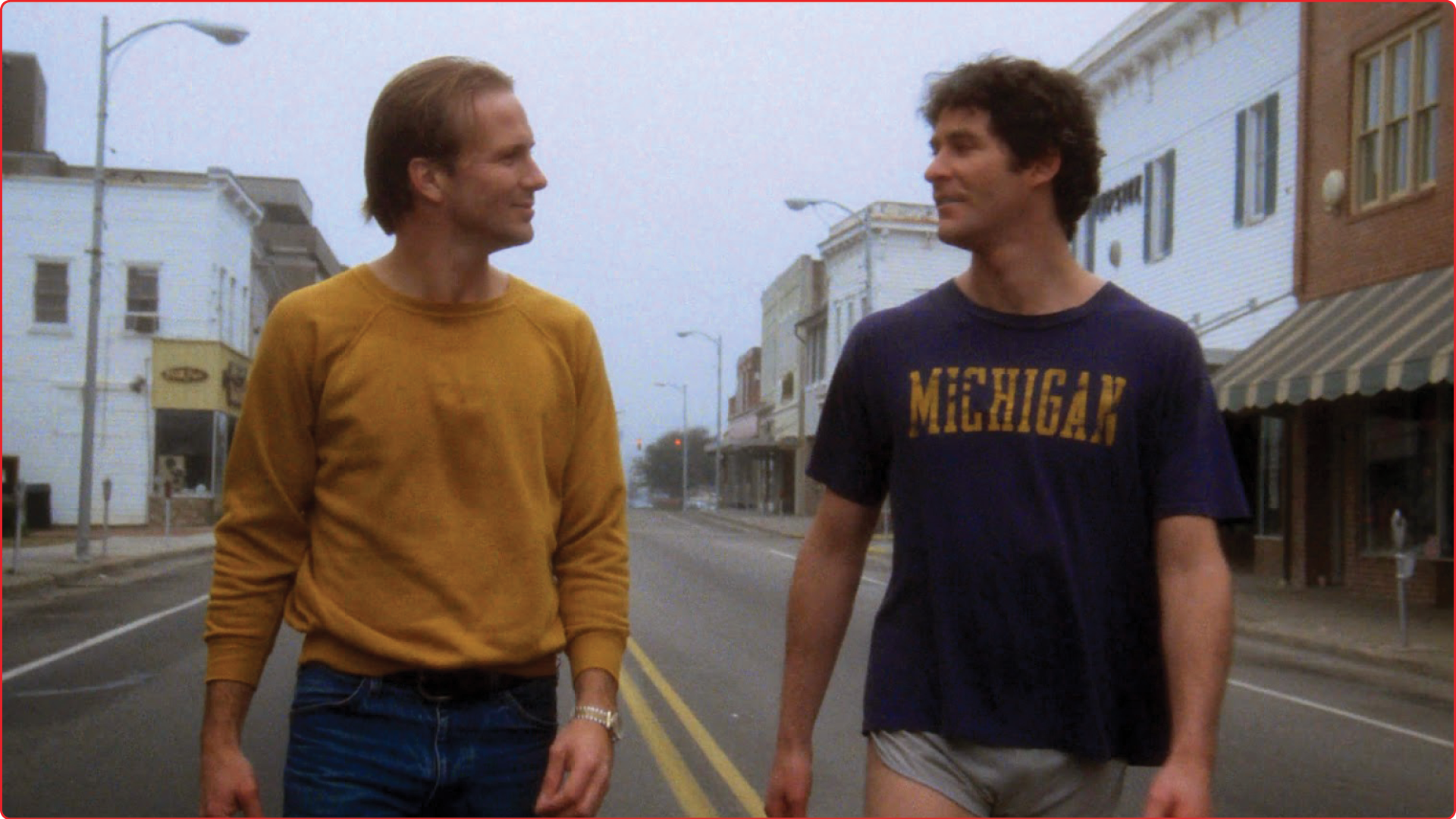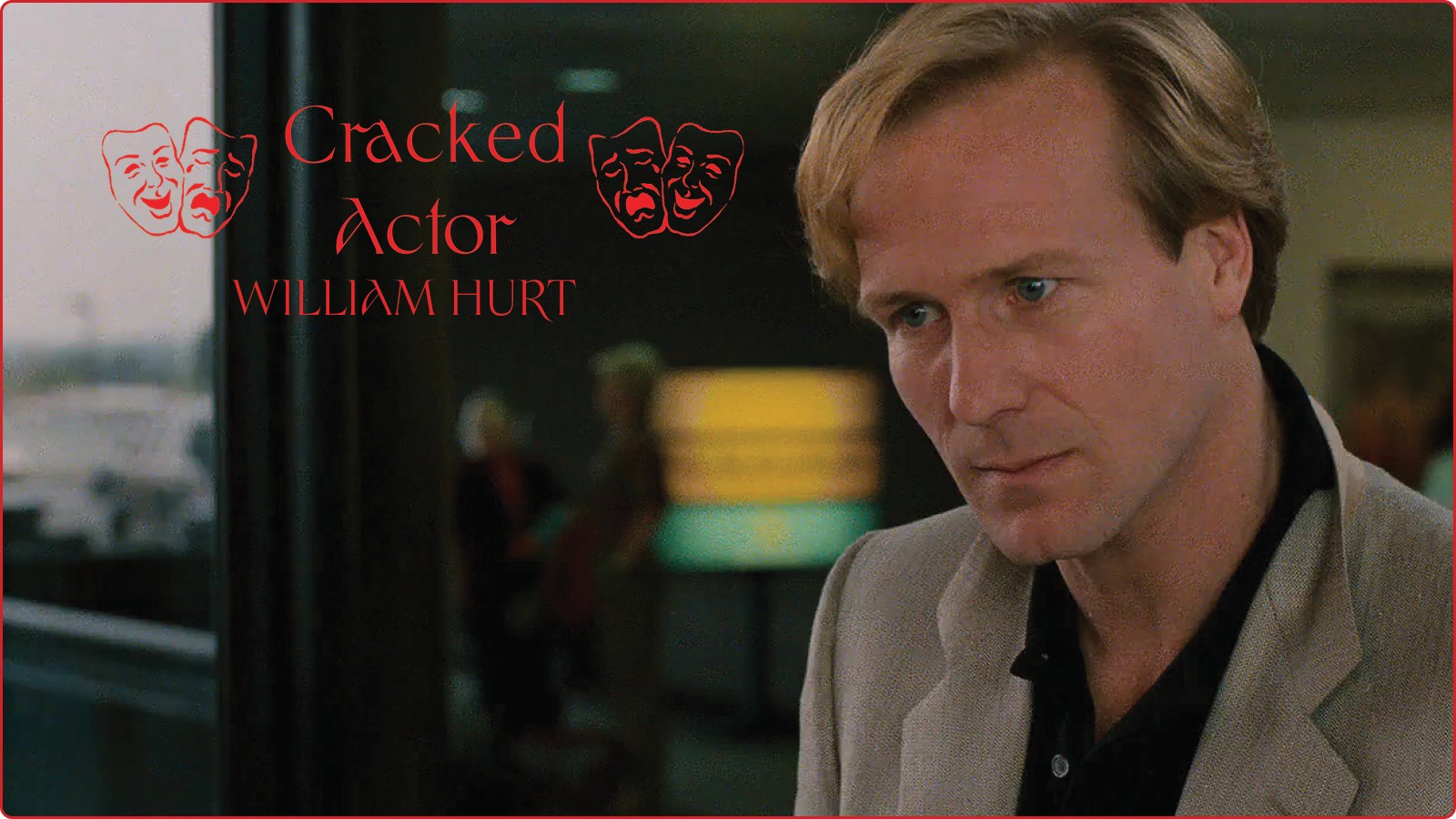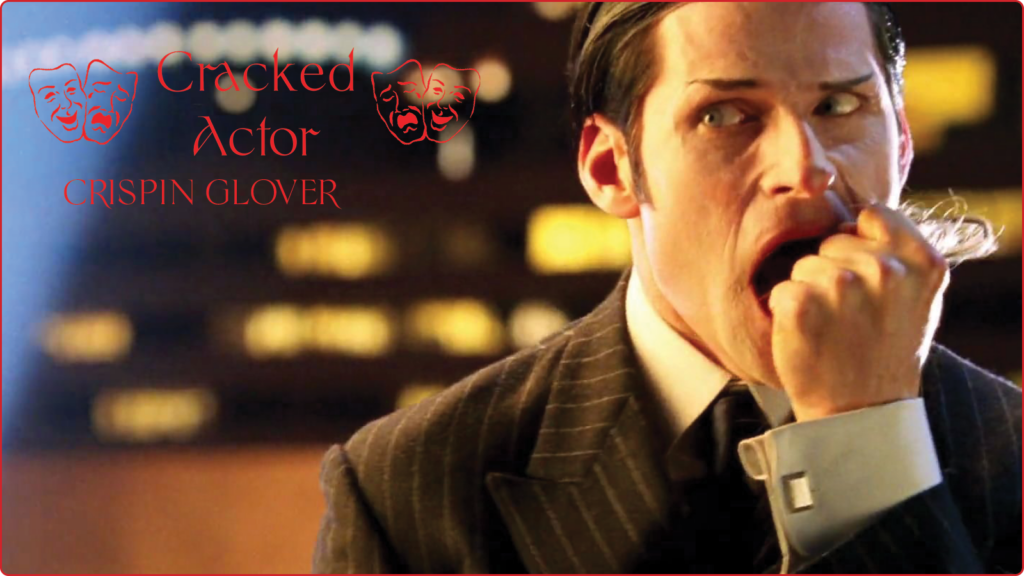Cracked Actor: William Hurt
BY
Vikram Murthi
On the devilish charms of ’80s William Hurt.
Broadcast News plays 7 Ludlow from Friday, October 27, as part of Metrograph Selects: Meg West.
In the world of Broadcast News (1987), the handsome, charismatic news anchor Tom Grunick, played by the late William Hurt, is the devil. He doesn’t understand the copy he reads on air, and he plays fast and loose with journalistic ethics. Yet, he continues to succeed in the broadcasting industry (or fail up the ladder, depending on how you look at it) because he “connects” with people. He can’t actually report the news, but he can sell it to the masses, which makes him a valuable asset to empty network suits and a target of derision from unphotogenic journalists with finicky principles.
In a film with a script characterized by self-consciously witty repartee, Hurt stands out as the dim bulb whose comebacks are always a little slow on the draw. It’s difficult to act dumb without resorting to caricature, but Hurt succeeds by foregrounding Tom’s self-awareness regarding his intellectual limitations—he never pretends to be smart, which only accentuates his vacuity. It’s easy to pity him when his aw-shucks expressions betray his brain working overtime trying to keep up with star reporters Jane (Holly Hunter) and Aaron (Albert Brooks). In Hurt’s first big scene, Tom lands in Jane’s hotel room and ignores her bedroom eyes to vomit insecurity about his lack of journalism experience. Hunter plays the clumsiness of Jane’s would-be seduction perfectly, but Hurt owns the frame with the honesty of Tom’s self-doubt; he deliberately sacrifices his attractiveness by trying to connect with someone he admires.
You can’t teach likability; it’s an innate characteristic that stems from a sincere appreciation of people and the joy of being in their company. Tom’s disarming earnestness compensates for his character’s lack of verbal savoir faire, and Hurt conveys it primarily with his inherent charm, which was at its height in Broadcast News, the film that caps his lauded run as a 1980s romantic leading man. A sitcom veteran, director James L. Brooks loves the close-up and the medium shot to communicate emotion, and in Broadcast News, he frequently lingers on actors simply smiling at Hurt’s presence. After he carries Jane over his shoulder up the stairs to the door of her apartment, Hunter beams in his direction like a schoolgirl. Jennifer (Lois Chiles), Tom’s co-worker, gazes admiringly at Tom’s naked body after sex, but grins from ear to ear when he admires the utility of her enormous bedroom-turned-closet and announces, “Isn’t this a great date?” Even Bobby (Christian Clemenson), the station’s resident editor, warmly thanks him for asking his opinion about a story. Tom’s kindness lends him an edge that people frequently underestimate, but more importantly, his puppy-dog stare and astonished countenance are never a pose. Rather, it’s how someone aware that they’re treated differently than others should move through the world.

Body Heat (1981)
A tall, blond, blue-eyed all-American type born into Washington D.C. corporate and political prestige, Hurt arrived on screen following a decade dominated by white ethnic, Method-driven male actors who pledged fealty to Lee Strasberg (De Niro, Pacino, Hoffman, etc.) It’s tempting to claim that his Gentile looks could have only flourished in the shadow of Reagan’s America, but Hurt’s classical appearance was always in productive tension with a sensitive, decidedly non-macho persona. His success as a romantic lead was predicated on a potent mix of carnality and soft compassion. Hurt specialized in playing the bold young man who would say things like, “I want to make love to you” to his female co-stars and mean it, imbuing a rank cliché with truth.
Granted, his carnality certainly remains fixed in the cultural memory. Under even slightly different circumstances, the brazenly aggressive flirting of Hurt’s himbo lawyer in Body Heat (1981) when he first meets Kathleen Turner’s femme fatale on the street would today be considered harassment. When they finally consummate their illicit affair, he flings a chair through her enormous, gaudy glass house just to get to her body. The film propelled Hurt to stardom partly based upon the resonant image of his and Turner’s sweaty, naked bodies tangled together like brambles. But as much as his performance depends on his physicality, it also teases out a heady contradiction between intrepid sexual confidence and love-blind gullibility. Much of the film’s tragedy lies in Hurt’s slow realization that he’s being manipulated by his paramour; he communicates this dawning awareness through his eyes, which start out agile and passionate but slowly become paranoid through heat exhaustion and logistical headaches.
Hurt had established his on-screen sexual magnetism while still in his twenties with his feature debut, Ken Russell’s sci-fi horror film Altered States (1980), which similarly depends on his vulnerable figure—either in an isolation tank while regressing into the consciousness of a caveman, or tripping on Mexican psychedelics in a remote cave—and the physical chemistry between him and co-star Blair Brown. His next major role, Peter Yates’s Eyewitness (1981), mostly concerns itself with an abstruse plot involving a murder committed in the name of persecuted Jews from the Soviet Union, but the film is grounded in Hurt’s single-minded infatuation with Sigourney Weaver. Him a janitor and Vietnam vet, her a news reporter from a wealthy family whom he aggressively pursues despite their class differences, managing to infuse innuendo into even an instruction in floor buffing. “I promise you, it will be wonderful,” he later tells her before they sleep together.
Five years later, Hurt’s turn in Children of a Lesser God (1986) emphasizes the borderline-saintly aspect of his personality. His role as an energetic hearing speech teacher who encourages his deaf students to vocalize via pop music and profanity falls squarely within a tired tradition of on-screen educators who “shake up the system” with unconventional methods. The scenes between him and the kids are fairly banal, but Hurt flexes his tenderness and patience in his scenes with Marlee Matlin, whose hard-nosed exterior as a deaf custodian predictably melts away when in his arms. Their inevitable conflict stems from intra-deaf politics regarding assimilating into able-bodied society, but their differing ideologies mostly conceals standard relationship strife—she thinks he’s suffocating her identity, he thinks she’s pulling away from him. (Surprise: they’re both right!)
Matlin’s stories about their real-life relationship history clashed with the benevolent image of Hurt in his heyday, with her accounts of their three-year union including sexual assault and countless bouts of violence. (Following a somewhat stormy sex scene in Children of a Lesser God, Matlin sports visible bruises on her legs, which she says were from a fresh incident with Hurt.) Her 2009 memoir paints a portrait of a drunken serial abuser who had a Dr. Jekyll and Mr. Hyde split to his personality, whereas onscreen Hurt comes alive playing a person whose emotions are unguarded, both in and outside the bedroom.

Kiss of the Spider Woman (1985)
Maybe it’s because of the Juilliard pedigree, or his stage work with Circle Repertory as a young man, but Hurt is an actor who frequently “makes choices” with his character work. Sometimes it’s simply a matter of tailoring his performance to the tone of the script, like embracing the operatic melodrama in Gregory Nava’s overheated war picture A Time of Destiny (1988), or committing to a creaky British accent for his Russian detective character in the Moscow-set procedural thriller Gorky Park (1983). Other times it leads to risky, compelling places, such as his Oscar-winning turn as the effeminate Molina in Kiss of the Spider Woman (1985), whose retellings of old films and bottomless kindness keeps up the spirits of his leftist revolutionary cellmate Valentin (Raul Julia). Adopting a nimble grace that genuinely surprises, Hurt moves with the restrained polish of a would-be performer whose situation has squashed his artistic dreams. His flamboyance feels artificial at times, and Spider Woman constantly rides a line of ’80s acceptability regarding expressions of queerness, but Molina’s refusal to temper his sexuality while remaining staunchly apolitical in the face of fascism makes for a potent interiority. I haven’t read Manuel Puig’s novel, but I don’t doubt that Héctor Babenco’s adaptation constrains its myriad literary, political, and sexual nuances. Still, Hurt lends a subdued realism in moments, for example, such as when he carefully cleans Valentin’s soiled pants, his performance rendering meekness a courageous virtue within a brutal setting.
It’s worth noting that the majority of Hurt’s films during the ’80s, his most successful decade, are dodgy prestige pictures whose claims to importance feel desperate or misplaced. The Accidental Tourist (1988), for example, takes the cake for one of the most boring, mannered literary adaptations of its time, and it mostly involves dead or sick kids and dog obedience training. Still, Hurt’s commitment to his roles has considerable allure even when his performance or the films fundamentally don’t work. His turn as Nick in The Big Chill (1983)—a widely beloved, frequently cringeworthy piece of ensemble acting and Boomer apologia—remains the film’s highlight, largely because he plays a character defined by lack instead of abundance. A drug-abusing, impotent Vietnam veteran, Nick clearly stands out in his crowd of wealthy yuppies, who have all gathered on a South Carolina plantation to send off a friend who ended his life.

The Big Chill (1983)
Director Lawrence Kasdan goes to great lengths to emphasize that Nick might be the next one to slit his wrists: though he can goof around like everyone else, his loner behavior and cynical attitude, clearly stemming from PTSD and sexual dysfunction, keep him at a distance. Instead of being patient with him, his friends frequently chastise him for not being properly deferential to a traffic cop, for ostensibly adopting an existential pose that’s at odds with his friends’ weepy nostalgia, or for being high, despite the fact that everyone consumes the drugs he brought. (One might argue this behavior illustrates the group’s myopia after rejecting their youthful radicalism, but The Big Chill isn’t savvy enough to execute such subtext.) During their final morning together as a group, Nick silently apologizes for blowing up at Sam (Tom Berenger) the night before by approaching him from behind, rubbing his shoulders, and whispering something into his skull. (Berenger’s warm, equally silent acceptance of this gesture resembles many male apologies I’ve witnessed.) Kasdan draws no attention to this moment—in fact, it happens on the far-left side of the frame away from the main action—but it lingers in my mind like other brief, loving motions Hurt makes during this period: a goofy smile he cracks while riding his janitor cart in Eyewitness; an eerie mirror psych-up scene in A Time of Destiny that plays like an odd homage to De Niro’s famous monologue in Taxi Driver (1976); the way he crumples on the prison floor like a heap of laundry in Spider Woman.
Hurt’s post-’80s career mostly featured him in supporting roles that allowed him to expand his repertoire, and of which there are notable highlights, such as a scene-stealing stoner assassin in I Love You to Death (1990), young David’s creator in A.I. Artificial Intelligence (2001), and a Philadelphia crime boss in A History of Violence (2005). But with his passing last year at 71, his leading man run still holds tremendous sway over his memory, in which Hurt sold sincerity of all stripes, whether wise or naïve. Returning to Broadcast News, the brilliance of Hurt-as-Tom can be distilled to his tone when he asks an envious, enraged Aaron, “What do you do when your real life exceeds your dreams?” (James L.) Brooks gives (Albert) Brooks the famous comeback—“Keep it to yourself!”—but Hurt’s delivery works because in that moment he isn’t being smug, he’s actually asking. Only the devil himself could be so honest.
Vikram Murthi is a contributing writer for The Nation and the editor of Downtime Magazine. He has also written for publications like Reverse Shot, Filmmaker Magazine, and Criterion. He’s still very much for hire.

Broadcast News (1987)



